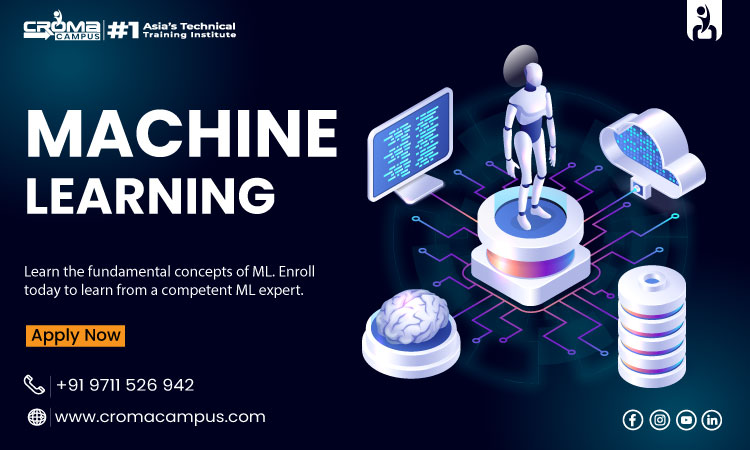Machine Learning (ML) is a vital sub-field of AI technology. It refers to the capability of modern machines to imitate human actions. Today, ML is used to detect fraud, check spam mail, send personalized recommendations, in internet search engines, etc. ML depends on data to learn and improve. Thus, the more data is fed to an ML device receives data, the more it learns to perform certain tasks. The Machine Learning Online Course with Certificate has been designed to train you in the most essential ML skills. These training programs help you make considerable career advancements. Moreover, ML is a constantly evolving field that integrates numerous latest technologies for more efficiency.
Healthcare, Finance, Manufacturing, E-Commerce and Transportation are the top industries leveraging ML for enhanced functioning. Let us look at how ML revolutionizes these vital industries.
1. Healthcare
The healthcare industry has seen remarkable advancements with the integration of machine learning. From medical imaging and diagnosis to drug discovery and personalized treatment plans, Machine Learning is revolutionizing healthcare. Moreover, radiologists use Machine Learning algorithms to assist in the early detection of diseases, such as cancer and neurological disorders, by analyzing medical images like X-rays, MRIs, and CT scans. Additionally, predictive analytics powered by Machine Learning helps hospitals optimize resource allocation and manage patient flow, ultimately improving patient care and reducing costs.
2. Finance
The financial sector is a data-rich industry where Machine Learning has made a profound impact. Investment firms, banks, and insurance companies utilize Machine Learning for risk assessment, fraud detection, and algorithmic trading. Moreover, Machine Learning algorithms analyze historical financial data to predict market trends, assess credit risks, and identify fraudulent transactions in real time. This enables organizations to make data-driven decisions and respond to market changes more efficiently.
3. E-commerce
Machine Learning has transformed the way netizens shop online. E-commerce platforms use recommendation systems that employ Machine Learning algorithms to personalize product recommendations based on a user’s browsing and purchase history. This not only enhances the user experience but also boosts sales and customer engagement. Additionally, Machine Learning is applied in supply chain optimization, pricing strategies, and demand forecasting to streamline operations and improve customer satisfaction.
4. Transportation and Logistics
The transportation and logistics industry has harnessed Machine Learning to enhance efficiency and safety. In autonomous vehicles, Machine Learning algorithms enable self-driving cars to perceive their surroundings and make real-time decisions. This makes transportation safer and more convenient. Moreover, Logistics companies use Machine Learning to optimize routes, track shipments, and predict maintenance needs for their fleets. This results in cost savings and improved service delivery.
5. Manufacturing
Manufacturing processes have been revolutionized by machine learning, leading to the emergence of smart factories. Furthermore, Machine Learning algorithms are applied to sensor data from equipment and machinery to predict maintenance requirements and reduce downtime. This predictive maintenance not only saves costs but also improves overall productivity and equipment longevity. Quality control is another area where Machine Learning excels. This technology can identify defects in real time, reducing waste and enhancing product quality.
Machine Learning Trends
-
Explainable AI (XAI)
Machine learning models have become increasingly complex, making it challenging to understand why they make specific predictions or decisions. Explainable AI (XAI) is a trend that aims to address this issue by making AI models more transparent and interpretable. XAI techniques, such as LIME (Local Interpretable Model-Agnostic Explanations) and SHAP (SHapley Additive exPlanations), allow us to gain insights into how ML models reach their conclusions. This trend is crucial for building trust in AI systems, especially in fields like healthcare and finance, where transparency and accountability are paramount.
-
Federated Learning
Privacy concerns have become a significant challenge in machine learning, as many models require access to large, sensitive datasets. Federated learning is a trend that addresses this issue by allowing models to be trained on decentralized data sources while preserving data privacy. This approach is particularly relevant in healthcare, finance, and other industries where data security and confidentiality are paramount.
-
AutoML
AutoML, or Automated Machine Learning, is a trend that simplifies the ML process, making it more accessible to a broader audience. AutoML tools and platforms allow individuals with limited machine learning expertise to build and deploy models. This democratization of ML empowers businesses to leverage AI in their operations without requiring extensive data science skills.
-
GANs (Generative Adversarial Networks)
Generative Adversarial Networks (GANs) have gained immense popularity in recent years, particularly in creative fields such as art, music, and content generation. GANs consist of two neural networks, a generator and a discriminator, which work together to create synthetic data. These networks have been used to generate lifelike images, compose music, and even develop text and video content. As GANs continue to evolve, their applications are extending beyond the creative sector into areas like data augmentation, fraud detection, and more.
-
Reinforcement Learning
Reinforcement learning is gaining traction in areas where decision-making under uncertainty is critical, such as robotics and autonomous systems. This trend involves training agents to interact with their environment and learn from the consequences of their actions. Deep reinforcement learning techniques have enabled impressive achievements, like the development of self-driving cars and sophisticated game-playing AI. As technology continues to advance, reinforcement learning will likely play a vital role in developing intelligent, adaptive systems.
-
Edge AI
Edge AI refers to the deployment of machine learning models on edge devices like smartphones, IoT devices, and edge servers, instead of relying on central cloud servers. This trend is gaining momentum due to the need for real-time processing and reduced latency, making it ideal for applications such as autonomous vehicles, healthcare wearables, and industrial automation. Edge AI can perform tasks locally, enhancing privacy and reducing data transfer requirements.
Conclusion
In summary, Machine Learning has made significant inroads into various industries, revolutionizing the way they operate. Healthcare, finance, e-commerce, transportation, and manufacturing have all leveraged the power of ML to enhance efficiency. Additionally, this technology helps companies reduce costs, and provide more personalized and reliable services. Delhi, one of the peak IT hubs has numerous companies that require skilled ML professionals. Therefore, the Machine Learning Course in Delhi helps aspiring professionals learn various industry-relevant skills. As the field of Machine Learning continues to evolve, we can expect further innovations and applications in these and other industries.



